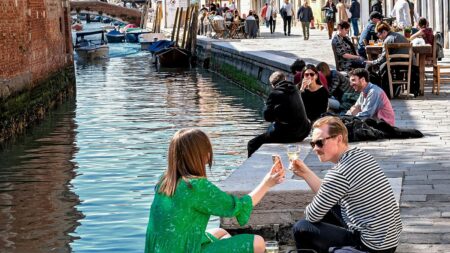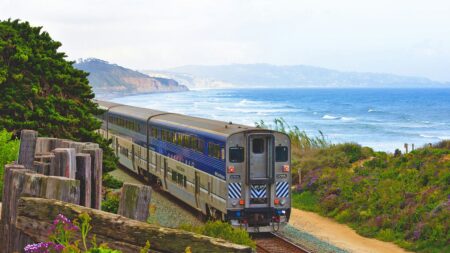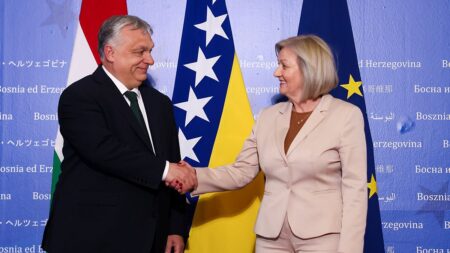“The unfair competition between trains and planes must be addressed,” says Belgium’s Minister for Mobility.
“Night trains are the future,” says Georges Gilkinet, Belgium’s Deputy Prime Minister and Minister for Mobility.
It’s something he hopes to persuade his EU colleagues of as Belgium presides over the Council of the European Union this year.
During the next EU informal meeting of transport ministers in Brussels in early April, Gilkinet will put night trains firmly on the agenda.
Together with Austria, Belgium has led the development of night trains in recent years. Both countries now want other EU member states to focus on connecting Europe’s major cities by sleeper train.
Here’s why Gilkinet is confident he can convince the European Commission “to accelerate the return of the night train”.
Europeans want to travel more sustainably
Europeans are increasingly turning their backs on flying due to its environmental impact. There has been widespread support for France’s short-haul flight ban, and Spain could soon follow suit.
A 2021 survey commissioned by campaign group Europe on Rail found that over half of respondents – in Germany, Poland, France, Spain and the Netherlands – were interested in replacing flights with rail.
But to make this a reality, train connections need to become better, wider reaching and less expensive for travellers. Only a few regular overnight services exist today, and for the same route, the train is on average four times as expensive as flying, a Greenpeace study found last year.
Gilkinet wants to bring change by creating favourable conditions for night train operators. He proposes enhancing international rail infrastructure, better integrating technical differences between countries, simplifying ticketing systems and reducing operational costs. “The unfair competition between trains and planes must be addressed,” he says.
Gilkinet sums up some measures that can level the playing field between trains and flights. “In Belgium, night trains pay no energy costs for locomotives and are exempt from track access charges. If every European country introduced similar measures, more operators will be encouraged to operate overnight trains.”
Unfair competition between trains and other transport
At the moment, the use of cars and aeroplanes is incentivised. Over the last two decades, EU countries invested 66 per cent more in motorways than in railways. This led to a 30,000 kilometre growth in highways, while railway lines were reduced by 15,000 kilometres.
The aviation industry, meanwhile, receives huge subsidies – these could add up to €80 for each return ticket, according to some calculations. Kerosene is virtually not taxed and airline tickets are free of VAT.
International trains do not enjoy these benefits and, in many countries, VAT is charged on tickets and electricity. The system of track access charges is disadvantageous for overnight trains since they cover long distances; this has a relatively high weight on the cost of operation.
Cars remain by far the most popular mode of transport in Europe. In 2021, almost 80 per cent of passenger-kilometres across the EU were travelled by car, 7.3 per cent by plane, and 5.6 per cent by train.
Austria leads the way in night train travel
During the upcoming meeting of EU transport ministers in April, Austria will take the floor.
The country’s national railway, ÖBB, has led the revival of night trains in Europe. “We will discuss with them what governments can do to improve and expand the network in Europe,” explains Gilkinet.
ÖBB has continued investing in sleeper trains when most other countries chose to abandon them. Recently it released modern carriages with individual sleeping capsules.
Outside those run by ÖBB, most international night train connections have disappeared, while a few domestic services still operate in large countries such as France, Italy and Sweden. In Eastern Europe the network is still relatively extensive.
New private operators, such as European Sleeper, are exploring the market and launching new services, including extending its connection from Brussels to Prague in March.
A simplified train booking system
As well as expanding the train network, a simpler booking system is needed to integrate services across the continent. Rail Europe is one of the few platforms that currently allows travellers to compare prices and travel options online.
“It should become easier for travellers to buy an international ticket,” says Gilkinet. “Public and private companies have to cooperate more and think from the perspective of the customer.”
The goal is to make booking an international train as easy as booking a flight. To achieve this, rail companies will need to be willing to share data in order to develop the necessary digital tools.
The Belgian EU presidency has also prepared some specific legislative work to improve cross-border connections, identifying the key ‘corridors’ of the trans-European transport network (TEN-T) such as Brussels-Basel-Milan.
Another critical point to solve is the lack of modern sleeper carriages that are available for operators.
EU transport ministers are expected to make a collective commitment for more night trains during the informal meeting on 2 April. It will then be up to the European Commission to take on the challenge.
This article was developed with the support of Journalismfund Europe.
Read the full article here











